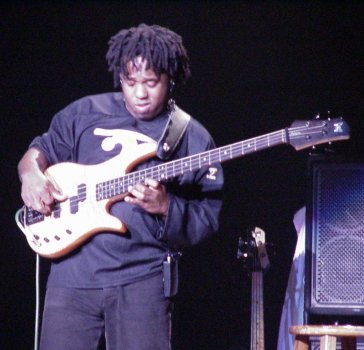| B i o g r a p h y |
 Victor Wooten
(DOB: 9/11/64) is one of the most celebrated electric bassists of all
time. His secret seems to lie in doing his own thing, breaking
boundaries and defying categorization along the way. Chip Stern wrote
in Musician Magazine that he is "proof that all men are not created
equal." To this Victor says, "A lot of guys who have been around for a
long time are shocked when they see some of the things I am doing.
Fortunately, they like it."
Victor Wooten
(DOB: 9/11/64) is one of the most celebrated electric bassists of all
time. His secret seems to lie in doing his own thing, breaking
boundaries and defying categorization along the way. Chip Stern wrote
in Musician Magazine that he is "proof that all men are not created
equal." To this Victor says, "A lot of guys who have been around for a
long time are shocked when they see some of the things I am doing.
Fortunately, they like it."
Victor's performances as a member of the Grammy-award winning
Béla Fleck and the Flecktones have gained him the adoration of
bass players and music fans worldwide. He was awarded a 1999 Nashville
Music Award for Bassist of the Year (his second) and in 1998, he
received his third Bass Player of the Year award from Bass Player
Magazine (the only bassist to have received this award more than once)
and was named one of the Top 10 Bass Innovators of the '90s by the same
publication. Also in 1998, Vic won his second Grammy (Best Instrumental
Composition for Almost 12 from The Flecktones album Left of Cool) and
Down Beat magazine voted him Talent Most Deserving Wider Recognition.
It was a very good year.
"Yin Yang"On Yin Yang, his third solo album, Victor again shows why
he is considered a master of the electric bass. Throughout the album,
Vic astounds with his remarkable technique, all the more exceptional
for the fact that it never gets in the way of his earthy feeling for
the groove. Together with a collection of guest artists including Kirk
Whalum, Bootsy Collins, Peter Rowan, Steve Bailey, Count Bass D,
Béla Fleck, Carter Beauford, Jeff Coffin, Rod McGaha, J.D.
Blair, Stuart Duncan and The Wooten Brothers, Wooten has created a
phenomenal musical offering full of creative compositions
Victor himself would be the first to tell you how his solo work is
influenced by those around him. "My brothers and parents were the
foundation," he says. "They prepared me for just about anything by
teaching me to keep my mind open and to learn to adapt. Musically, that
means not being rigid and not having to play in a certain way." Vic
grew up in a military family, the youngest of five brothers. His
brothers all played and sang, and by the time he was 3, oldest brother
Regi was teaching him to play bass. Wooten credits his open-mindedness
about music to this early start. "When you're older, you're more
hesitant to try something because you're afraid it will look wrong or
come out wrong. When you're a child it doesn't matter. We'd try
anything. We'd do anything we could think of to try and duplicate the
sounds we heard on records. I'd learn songs one note at a time by
listening to records on the player, moving the needle back and then
listening to it again. Playing the bass was like learning how to talk
for me. It was just another language I was picking up."
The Wooten Brothers
Victor made his professional stage debut at age five with "The
Wooten Brothers Band", the five-brother band that started out playing
covers and later opened concert tours for Curtis Mayfield and War. They
also spent several years playing music and honing their skills at Busch
Gardens theme park in Williamsburg, Virginia. This experience provided
him with a valuable training ground and a vehicle for his musical
development.
In 1988, Victor moved to Nashville and was immediately recruited by blues and soul singer Jonell Mosser. The following year he joined New Grass Revival's banjo ace Béla Fleck, who hired him and his brother, known as Future Man, to play in a jazz band for a Lonesome Pine Special TV show. The two brothers became the rhythm section and with Howard Levy on keyboards and harmonica. The Flecktones were born.
Official Homepage: www.victorwooten.com